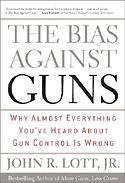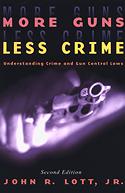Prison deters crime. It also keeps violent criminals off the street. Research by economists consistently indicates that while most of the drop in violent crime during the 1990s occurred because of more arrests and convictions, longer prison sentences also played a role, albeit a lesser one.
As crime has fallen, we have had more and more resources devoted to catching and punishing fewer and fewer criminals. That further raises the likelihood of detection, punishment and reducing crime.
Unfortunately, after years of large increases in state government expenditures, many states face big deficits. Although expenditures on incarceration make up less than 4% of state budgets, the pressure to cut is still there. Some states are considering eliminating mandatory minimum sentencing, revisiting three-strike rules or reforming sentencing guidelines.
Whatever the budget implications, some welcome the changes simply because they believe many penalties are too harsh. A number of studies indicate that three-strike rules significantly reduce crime, and states that have implemented them experience thousands of fewer violent crimes. Stiffer penalties for repeat criminals may also be justified simply because there is less doubt that the party being punished is really guilty.
 But not all increases in penalties are equally successful in reducing crime. Some misguidedly focus on how the crime is committed — such as with a gun — rather than on the crime itself. Criminals frequently enough can change the weapon used in a crime. Unfortunately, none of the studies examining statutory minimums for using a gun in a crime has found a significant reduction in violent rates.
But not all increases in penalties are equally successful in reducing crime. Some misguidedly focus on how the crime is committed — such as with a gun — rather than on the crime itself. Criminals frequently enough can change the weapon used in a crime. Unfortunately, none of the studies examining statutory minimums for using a gun in a crime has found a significant reduction in violent rates.
 Sentencing reforms have produced some perverse results. For example, the primary goal of sentencing guidelines was to reduce the disparity among criminals who committed the same crime. Yet, by equalizing only prison sentences, the guidelines make it impossible for judges to equalize the “total” penalty, which can include fines and restitution. How these are imposed can vary dramatically among criminals.
Sentencing reforms have produced some perverse results. For example, the primary goal of sentencing guidelines was to reduce the disparity among criminals who committed the same crime. Yet, by equalizing only prison sentences, the guidelines make it impossible for judges to equalize the “total” penalty, which can include fines and restitution. How these are imposed can vary dramatically among criminals.
Sentencing can be improved, and some penalties are too high, but if the reformers get their way, expect one thing: higher violent crime rates.



